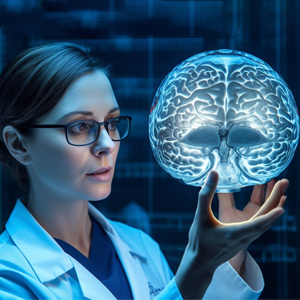How AI is Transforming Medical Education
 Recent breakthroughs in artificial intelligence and robotics show considerable potential for revolutionizing a variety of medical sectors. AI and robotics have the potential to revolutionize healthcare by automating and enhancing a wide range of operations, from direct patient care to bulk drug manufacturing. Several significant technology companies are already betting on AI and robots to improve the healthcare business. AI is also being used to automate time-consuming administrative duties like grading examinations, giving medical educators more time to focus on teaching. AI may also assist in recognizing trends in medical data, such as detecting illnesses and properly diagnosing patients.
Recent breakthroughs in artificial intelligence and robotics show considerable potential for revolutionizing a variety of medical sectors. AI and robotics have the potential to revolutionize healthcare by automating and enhancing a wide range of operations, from direct patient care to bulk drug manufacturing. Several significant technology companies are already betting on AI and robots to improve the healthcare business. AI is also being used to automate time-consuming administrative duties like grading examinations, giving medical educators more time to focus on teaching. AI may also assist in recognizing trends in medical data, such as detecting illnesses and properly diagnosing patients.
AI-enabled apps can give individualized learning strategies for medical students, allowing them to learn more quickly and efficiently. AI may also be utilized to give insights into medical research, allowing medical students to keep current on the newest discoveries in their profession. However, there is a risk that AI will be employed in ways that are damaging to medical students. AI may, for example, be used to construct biased learning programs that favour some students over others. AI might potentially be used to generate biased insights into medical research, causing students to make incorrect conclusions regarding their study. Now, let us look at three major criteria.
Enhanced Diagnosis and Decision-Making Skills
AI is revolutionizing the way medical students acquire and develop diagnosis and decision-making skills. With the aid of machine learning algorithms, AI systems can analyze vast amounts of medical data and provide accurate clinical insights. Medical students can benefit from this technology through access to real-time, evidence-based information and clinical decision support systems. These AI-driven tools enable students to develop critical thinking and analytical skills, aiding them in accurately diagnosing and treating patients.
One such example is the use of AI-powered virtual patients. These simulated cases allow medical students to practice and refine their diagnostic abilities in a risk-free environment. By interacting with virtual patients that exhibit a wide range of symptoms and medical histories, students can gain valuable experience and receive personalized feedback. AI algorithms can track their performance, identify areas for improvement, and customize the learning experience accordingly.
“The most exciting prospect for artificial intelligence in healthcare is the potential to revolutionise clinical procedures. Clinicians only need to realise the potential of this new technology and accept the reality of global shifts to be able to react to future trends and the incorporation of AI into the healthcare system. “Says Dr Vijay Patil is President, DY Patil Hospital and Research Centre, Navi Mumbai.
Personalized Learning and Adaptive Curricula
AI has the potential to personalize medical education by tailoring learning experiences to the individual needs and abilities of each student. By analyzing data on students' performance, learning styles, and knowledge gaps, AI algorithms can create adaptive curricula that optimize learning outcomes. Personalized learning platforms can deliver targeted educational content, identify weak areas, and provide supplementary resources to strengthen understanding.
Additionally, AI-powered virtual tutors can provide individualized guidance and support to medical students. These intelligent systems can answer questions, provide explanations, and offer personalized feedback based on each student's progress. By continuously adapting to the learner's needs, AI tutors facilitate self-paced learning, helping students gain confidence and proficiency in medical knowledge and skills.
Simulation and Surgical Training
AI is revolutionizing surgical training by providing realistic, immersive, and risk-free simulation environments. Medical students and aspiring surgeons can utilize virtual reality (VR) and augmented reality (AR) technologies to practice complex procedures, refine their technical skills, and improve patient outcomes. AI algorithms enable these simulations to replicate realistic anatomical structures, physiological responses, and surgical scenarios.
Furthermore, AI can analyze a surgeon's movements and provide real-time feedback on technique and performance. By leveraging machine learning algorithms, surgical trainees can receive personalized guidance on improving their surgical skills, reducing errors, and enhancing patient safety. This AI-enabled feedback loop accelerates the learning process and ensures that surgeons acquire the necessary proficiency before operating on live patients.
AI is redefining medical education by changing the way doctors learn, diagnose, and treat patients. Medical students may use the power of AI algorithms to evaluate complicated medical data and make correct clinical decisions by improving their diagnostic and decision-making abilities. Personalized learning platforms and adaptable curricula enable students to customise their educational experience, addressing knowledge gaps and improving comprehension. AI-powered simulation and surgical training give medical students a risk-free environment in which to acquire and enhance their technical abilities.
As the healthcare environment evolves, artificial intelligence (AI) will play an increasingly important role in moulding the future of medical education. Medical schools and institutions may educate well-rounded, competent healthcare workers who are prepared to handle the difficulties of an ever-changing healthcare market by using the potential of AI. Medical education is set to achieve new heights of efficacy and brilliance with AI as a driving force.

